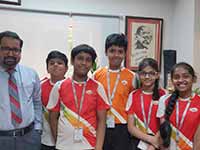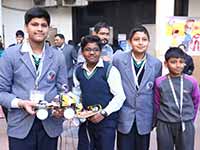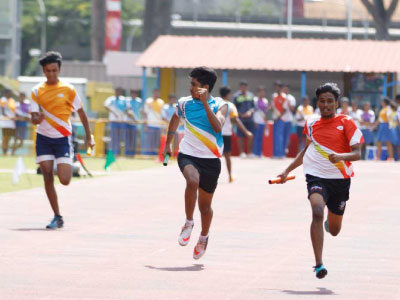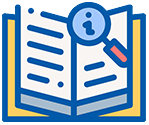A student sits with a book open, but the mind drifts. A buzz from the phone, a new video on the screen, or a sudden thought—just like that, focus is lost. In a time where alerts and pings demand attention, staying on track is tough. Parents and teachers see this daily. Kids seem busy, but are they learning?
In India, 43.3 million students are in higher learning, but how many get the most from their time? Some read for hours but recall little. Others grasp ideas fast but struggle to stay on track.
This guide shares ways to improve focus, manage time, and build habits for better learning. The productivity equation plays a major role in how well students manage time and effort. Parents, teachers, and students must all work together to understand how to avoid distractions and create an environment that fosters deep learning.
The Productivity Equation: What Makes a Student Efficient?
Every student puts in time, but only a few get strong results. The equation of productivity explains this gap. Learning is not about long hours but how well time is used.
Three Key Parts of the Productivity Equation
| Factor | Meaning | Example |
| Time Planning | Set hours for work, rest, and breaks | Pomodoro method for study |
| Focus Methods | Steps to stay on task | Block phone alerts, use study apps |
| Energy | Food, sleep, and body health | Sleep for 7+ hours, eat brain food |
A plan is key. Students who use good time tools, focus skills, and rest well do better. When schools and parents support a structured learning approach, students can truly master the equation of productivity.
How to Avoid Distractions: Simple Ways for Parents and Teachers
A beep, a flash, or a sound can break focus in seconds. A silent phone still steals attention. A noisy class, stress, and a messy space also hurt focus. How to avoid distractions is a major challenge for both students and teachers.
Steps to Cut Distractions at Home and School
- Set a Study Zone – A neat and quiet space helps the brain stay on task.
- Limit Screen Use – Set clear hours for phones and online use.
- Use Focus Tools – Apps that stop alerts can help.
- Train the Brain – Deep breaths or small breaks reset the mind.
- Use Reward Plans – Small wins keep students on track.
By understanding how to avoid distractions, students can create better habits that improve concentration and memory.
Schools can set ‘no-phone hours.’ At home, parents can help kids stick to study hours. The more structured the learning space, the easier it is to maintain the productivity equation.
Does the Learning System Help or Hurt Focus?
In India, only 35.3% of five-year-olds start early learning. This means many kids miss key growth years.
A heavy syllabus, rote learning, and lack of revision time make it hard for students to focus. Schools must break lessons into smaller, interactive parts, using real-world examples. Personalized study plans also help students learn in a way that fits them. Parents looking for international school in Noida should focus on schools that balance theory with practical learning.
Time use is also key. Without a plan, most of it is wasted. Students need to follow simple rules like finishing short tasks immediately, sorting work by urgency, and planning their day in a structured way. Schools that offer class 11 admissions often train students in time management to improve their equation of productivity.
The Role of Parents in Building Better Study Habits
A child’s study habits start at home. Schools provide knowledge, but parents shape how kids learn. A home that supports focus helps students do well in school. Small steps from parents can make a big difference.
How Parents Can Help
- Set a Daily Study Routine – A fixed time for schoolwork builds discipline.
- Reduce Unwanted Distractions – Keep study areas free from noise and gadgets.
- Encourage Breaks – A tired mind does not learn well. Short breaks help refresh focus.
- Show Interest in Learning – Ask about what they studied. A small chat makes learning fun.
- Provide the Right Tools – A good chair, desk, and proper lighting make a difference.
Parents must understand how to avoid distractions in a student’s daily life. The right home environment ensures children develop the ability to manage the productivity equation effectively.
Good Food and Sleep for a Sharp Mind
A tired brain does not work well. A hungry brain loses focus fast.
What Should Kids Eat to Stay Sharp?
- Brain Boosting Fats – Found in fish, nuts, and seeds.
- Long-Lasting Energy – Whole grains keep focus steady.
- Water – Even mild thirst slows the brain.
Parents must make sure kids eat well and sleep enough. The equation of productivity relies on good physical health, and understanding how to avoid distractions includes getting proper rest.
Group Study vs. Solo Study: Which One Works Best?
Some students like to study alone. Others need a group to stay motivated. Both methods have benefits. Choosing the right way depends on the child’s learning style.
When to Choose Solo Study?
- The student learns better in silence.
- Focus improves without peer distractions.
- Self-paced study works well for deep learning.
When to Choose Group Study?
- Discussing topics improves understanding.
- It helps in subjects that need brainstorming.
- Group motivation prevents procrastination.
Students must balance solo and group learning to build an effective productivity equation. They must also learn how to avoid distractions in both settings.
How Schools Can Improve Student Productivity
Schools play a big part in shaping how students manage time and focus. The right teaching methods can help students grasp concepts faster and retain them longer.
What Schools Can Do?
| Method | How It Helps |
| Reduce Rote Learning | Encourages thinking and problem-solving |
| Allow Short Breaks | A small pause refreshes the mind |
| Use Visual & Practical Learning | Improves memory with images and real-world examples |
| Encourage Physical Activities | Reduces stress and keeps the brain active |
| Teach Time Management | Helps students plan study hours better |
Educational institutes with modern teaching styles, like class 11 admissions, focus on these methods. By managing the productivity equation effectively, schools ensure students achieve better results.
How Technology Affects Learning: Friend or Foe?
Technology can either waste time or save time, depending on how it is used.
Best Study Apps for Students
- Stay Focused – Blocks time-wasting apps.
- Easy Notes – Helps to sort class notes.
- Grammarly – Checks grammar while writing.
If used right, tech can boost learning, not harm it. Managing how to avoid distractions while using technology is key to making it work for students. International curriculum schools in Noida focus on integrating technology effectively, ensuring students benefit from digital tools while maintaining focus.
Final Thoughts
A smart study plan does not need long hours. It needs right habits.
Parents and teachers must help students manage time, cut distractions, and build strong study skills. With small changes, kids can stay on track and learn better. Understanding the productivity equation and learning how to avoid distractions ensures better academic performance.
If this guide helps, share it with more parents and teachers!























